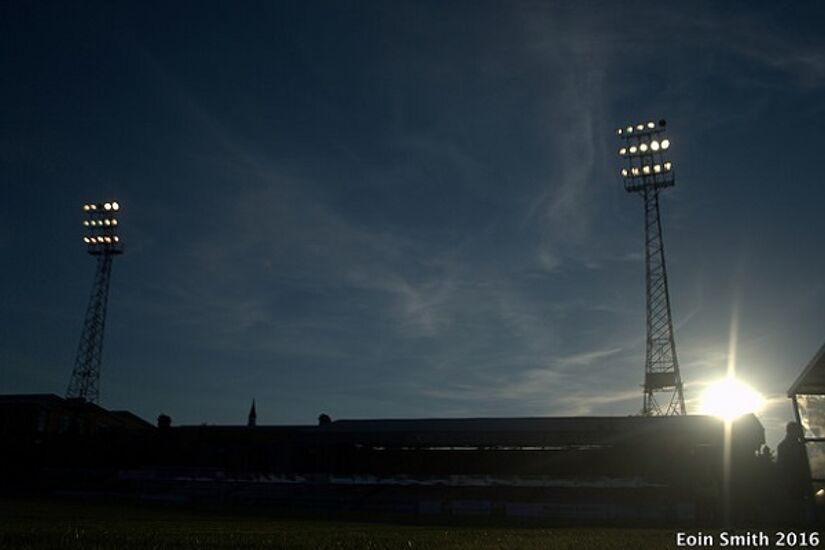From the Archives: Brian Shelley on becoming disillusioned with financial mismanagement in the League of Ireland

Credit: Eoin Smith (ETPhotos)
In our latest dip inside the extratime.com archives we go back to a 2017 interview with former League of IReland winner Brian Shelley.
Having won every domestic honour, sampled life cross channel and becoming disheartened with League of Ireland clubs’ financial mismanagement, Brian Shelley turned to the southern hemisphere for coaching positions, whilst still continuing as a player. ExtraTime.ie caught up with Brian, to hear his thoughts on an extraordinary footballing career.
Beginning his League of Ireland journey on Shamrock Rovers’ books, Shelley moved to rivals Bohemians in 2000 without making a senior appearance for the Hoops. The same season, he helped the Phibsboro outfit to the double and after a brief spell with Longford Town in 2002, alongside other League of Ireland players, joined Roddy Collins’ Carlisle United.
“It was good to experience England and League Two, which was a reasonable standard. I was the last Irish player to leave, after two seasons with Roddy and another with Paul Simpson. I definitely came back to Ireland a better player.”
Part of 2003/04’s squad, who lost their league status, Brian was then absent when the Cumbrians earned promotion at the first attempt via the play-offs: “I played around 20 games the season they got promoted. Paul decided to release me that year, but had done it to lots of players before me. I did contribute a lot that campaign, but it was disappointing to miss out.”
After playing the majority of 2005 with Shamrock Rovers, the Dubliner moved to Drogheda United that winter. Consecutive Setanta Sports Cup triumphs in 2006 and 2007 followed, but clinching the Louth club’s first Premier Division during the latter year eclipses those achievements for Shelley.
“That was the first league title I’d really won because I played in every game. There’s something special about winning a league outside of Dublin. The whole town is behind you and United Park would be full in the run-in. The way everybody celebrated and welcomed us after winning, made it an incredible season.”
Brian’s peers rewarded his performances by announcing him as PFAI 2007 Player of the Year: “To be voted by fellow players is the best accolade you can get. As a defender, I was honoured just to be nominated, but to win it was unforgettable.”
When Drogheda went into financial meltdown, Shelley re-joined Bohemians in 2009: “I was happy Pat Felon came knocking. He assembled a strong group, which I was fortunate to be a part of. We did well in Europe and picked up another league title.”
In addition to the Premier Division, Bohs captured the League of Ireland Cup and Brian was also named in 2009’s Team of the Year: “I knew that we would be a force. Pat began to play me more at centre-half, which I enjoyed and had a good year. To be so successful, I wasn’t surprised.”
In late 2010 Shelley departed Dalymount Park – owed wages and proposed courtroom action, culminating in an FAI resolution: “People running the club gambled with players’ futures by presenting unaffordable contracts. They offered me a small settlement to walk from the contract and I agreed because I knew they were in financial trouble. I was then told that I would only get it if the other eight players under contract accepted the same settlement. Some of them had years to run and were on more money than me, so I didn’t see it working. Supporters turned on me, instead of the decision makers responsible. I made a stand for all players because this was going on for too long at clubs.”
Seeking to escape domestic uncertainty, Brian opted for Australia and Victorian side Ballarat Red Devils: “I was disillusioned after Drogheda and then Bohs one year later. It had a massive impact on me and my family. I’d done my UEFA B Licence and in the League of Ireland it was like a merry-go-round, with the same managers turning up at different clubs. I had a few years left to play, so I looked abroad. Shamrock Rovers offered me a three-year contract and it was difficult to decline, but I went to Australia to carve out a coaching career after finishing playing. I’ve had amazing experiences I never would have got at home as a young coach. The level wasn’t great, but I was a head coach in my second year. I got to work with fantastic people. Paul Smalley, Ballarat’s Technical Director, worked with the English FA. He coaches coaches and mentored me for two years.”
Shelley then moved to New Zealand side Waitekere United, where on top of playing, shared head coach duties with Paul Temple: “I found it difficult and think being a player/coach doesn’t work. You’re not getting what you need as a player and not giving others what they require from a coach. I don’t regret it, as I’ve all these coaching experiences under my belt at 35 ... They shape you for the future.”
As well as these duties, Brian fulfilled numerous other roles for Waitekere: “I was involved in so many ways, which probably wasn’t good for me in the end. It’s a strange set-up out here, as it’s a franchise league, with a senior team and nothing underneath. I couldn’t get my head around that most clubs don’t have a youth system, so the titles I had sound more than what they were ... I wasn’t in charge of a proper club with underage teams. During this time, I also completed my UEFA A Licence, while playing, coaching and interacting with the board, getting a whole understanding of how a football club works. There was heaps I would do differently, but what I’ve learned will be invaluable when I return to coaching.”
Shelley concludes by informing of his current positions: “I’m player/assistant coach part-time for a club in Auckland called Western Springs. The head coach is Neil Emblen, who played for Wolves. I’m also working within a business that specialises in IT equipment, as a manager for the last two years. It’s my first role outside of sport.”

